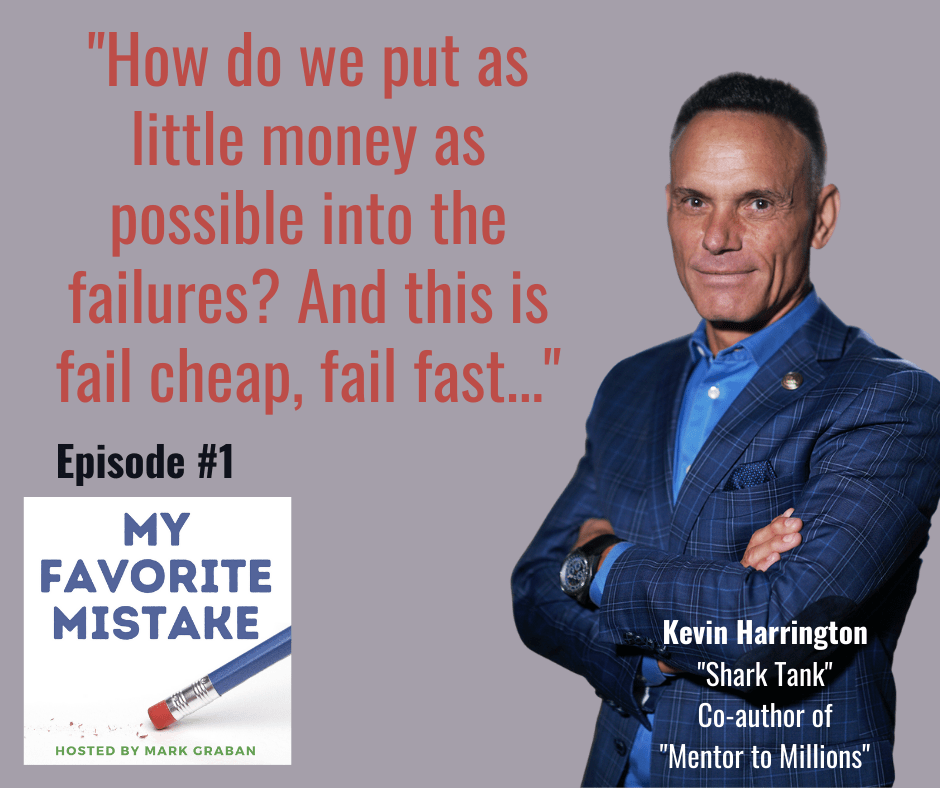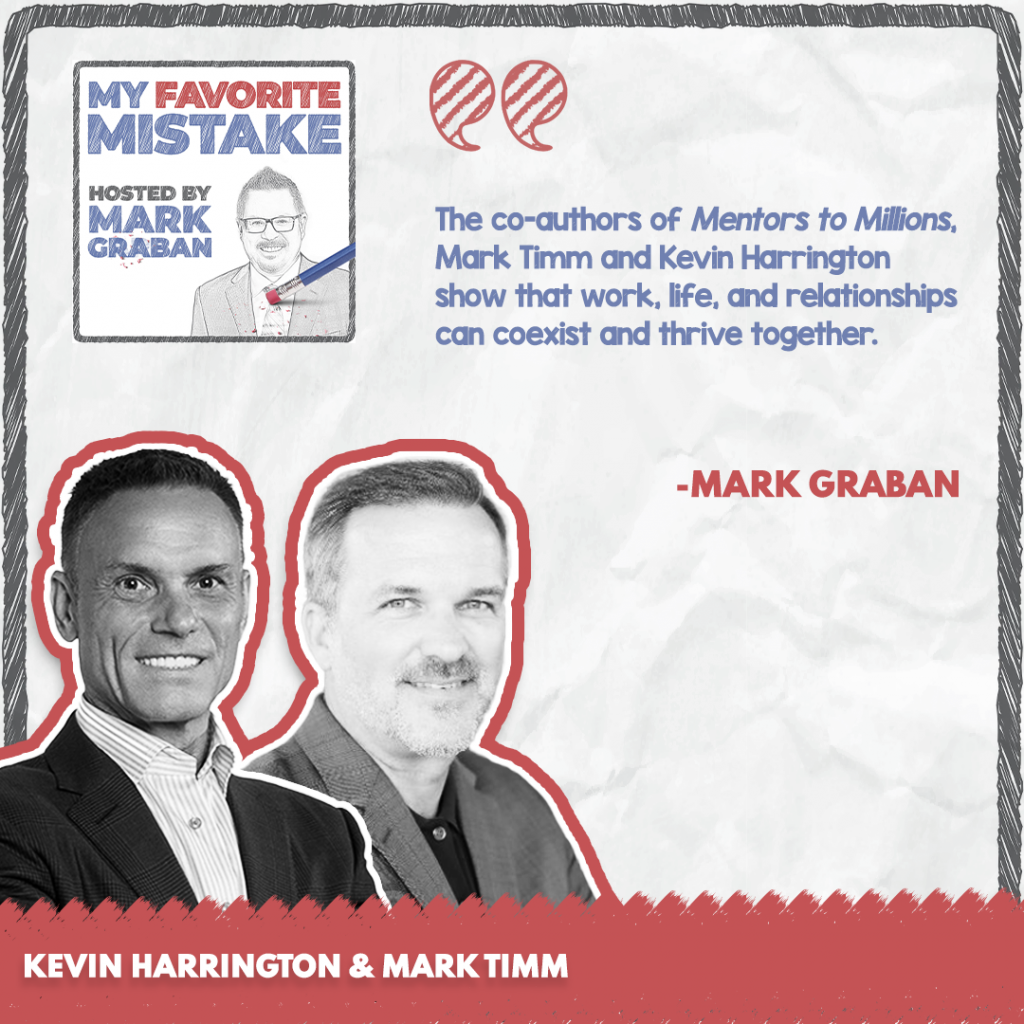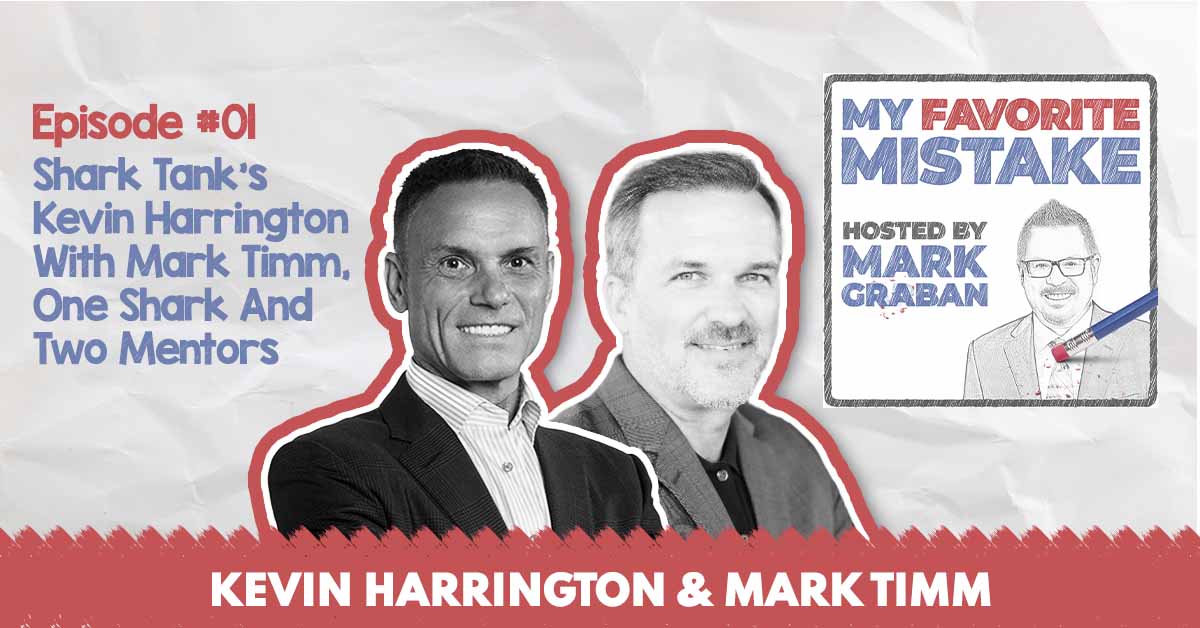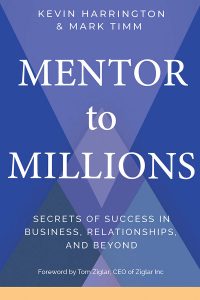Listen:
Check out all episodes on the My Favorite Mistake main page.
I'm really excited that my guests for the inaugural episode of the “My Favorite Mistake” podcast are Kevin Harrington and Mark Timm, co-authors of the new book Mentor to Millions: Secrets of Success in Business, Relationships, and Beyond.
You probably know Kevin as one of the original “sharks” on the hit TV program “Shark Tank.” He's the creator of the infomercial, pioneer of the “As Seen on TV industry,” and co-founding board member of the Entrepreneur’s Organization (EO), founded in 1987.
Mark Timm has been a serial entrepreneur and exponential-thinking practitioner for almost three decades. He has started more than a dozen companies, several of which have multiplied and been sold. He has spoken professionally for more than 25 years, giving thousands of speeches to over a million people around the globe.
In today's episode, they both open up about their “favorite mistake” and what they learned from that. They'll also share stories about Kevin mentoring Mark and others and some common mistakes that can be made in a mentoring relationship.
If you're interested in the book, be sure to check out their website. I am also running a giveaway contest, via my blog, where you can enter to win one of two copies of the book.
At the end of the episode, Mark and Kevin share a special offer related to some extra materials that you can get, for free, when you buy the book.

Watch the Full Episode:
Quotes:



Subscribe, Follow, Support, Rate, and Review!
Please follow, rate, and review via Apple Podcasts or Podchaser or your favorite app — that helps others find this content and you'll be sure to get future episodes as they are released weekly. You can also become a financial supporter of the show through Anchor.fm.
You can now sign up to get new episodes via email, to make sure you don't miss an episode.
This podcast is part of the Lean Communicators network.

Other Ways to Subscribe or Follow — Apps & Email
Shark Tank's Kevin Harrington With Mark Timm, One Shark And Two Mentors

I'm Mark Graban. This is My Favorite Mistake. In this show, you'll hear business leaders and other interesting people talking about their favorite mistakes because we all make mistakes, but what matters is learning from our mistakes instead of repeating them over and over again. This was the place for honest reflection and conversation, personal growth, and professional success. Visit our website at MyFavoriteMistakePodcast.com. Thanks for reading. Now, on with the show.
—
I'm excited to be joined by two guests. They are coauthors of the upcoming book, Mentor to Millions: Secrets of Success in Business, Relationships, and Beyond. Our guests are Kevin Harrington and Mark Timm. I’m going to tell you about Kevin real quickly. You may recognize him as one of the original sharks on the hit TV show, Shark Tank. He's the Creator of The Infomercial. He's a pioneer of the As Seen on TV industry, and he is the cofounding board member of the Entrepreneurs' Organization, EO, founded in 1987. You can learn more about Kevin at KevinHarrington.tv.
We're joined again by his coauthor, Mark Timm. Mark has been a serial entrepreneur and exponential thinking practitioner for decades. He started more than a dozen companies, several of which have multiplied and have been sold. He has spoken professionally for many years, giving thousands of speeches to over a million people around the globe. You can find out more about him at MarkTimm.com. Kevin and Mark, thank you so much for being here.
Thanks for having us, Mark.
Thank you.
I want to let the audience know, related to their book, Mentor to Millions, if you stay on until the very end of the episode, you're going to learn about a special offer. If you'd like to have a shark as your mentor, make sure you stay tuned for that. The theme here on the show is about learning from mistakes, growing, and reflecting on something you might consider your favorite mistake. Kevin, what would you want to share with the audience there?
I'm going to go back. It was many years ago. I made a big mistake. I made plenty since then too, but I'll go back to one of the first big ones that I made. I was in the As Seen on the TV business. We were doing about $100 million a year in business. We built the company up nicely. We had about a dozen products on television like Jack LaLanne on the juicer, George Foreman, Tony Little, Billy Mays, and all that kind of stuff.
Every week, we would do about $2 million in sales. Most of it happened over Friday, Saturday, and Sunday because we didn't like to advertise on Wednesday morning when the wife was home. It was more weekend-oriented. I would leave on Friday and come in on Monday and expect we're going to get our tally on sales. We're going to get that $1.8 million to $2 million in sales deposited in our account on Monday morning.
I come in on Monday. My CFO is sitting in my office. He was very upset and was like, “Kevin, I don't know what or how to tell you, but the bank is not going to send us the $2 million this week. They're holding it.” I'm like, “What do you mean?” They're holding it in a reserve account against our credit card processing account. As we got into it, as it turned out, they did have a legal right to do that, at least, initially.
If they felt they didn't have enough reserves, we had a $500,000 reserve sitting there. Now, that $2 million represented my life, my business. This was many years ago. I was not a wealthy guy at the time. That was my cashflow, my operating capital, my payroll for the next week, my inventory, and my media. It was my existence. To them, they thought, “This guy's doing $100 million. We're going to grab $2 million,” but we were out of business.
What we found was this. We sat down at the bank. One of our products was having a big defect problem from the factory. We would bring 10,000 pieces in. We would ship 10,000 pieces, and 3,000 of them were defective. All these calls are going to the banks. What the banks have to do is, “Let's freeze this account.” That's what they did. They grabbed all of our cash. They froze the account and put us out of business more or less.
At the end of the day, we ended up working ourselves through this whole mess. What ended up happening was a long story. I won't get into every detail. We were able to force them to give us back $1.6 million of it eventually but not a day later, unfortunately. We let them have an extra $400,000, but this is what we did and this is what we learned. We had twelve products running on one merchant account. If you have one little problem with one product, you're out of business.
This product represented probably 3% of our sales, but 100% of our aggravation with the bank. What we did from there is we set up separate merchant accounts for every single product, separate businesses, separate profit and loss statements, etc. We ran our business completely in these little silo situations. It was an amazing learning curve. We did get our money back. We did survive. We ended up building that business to $500 million eventually. However, at the end of the day, we would never have been able to do it if we still ran on one merchant account. That was a big learning curve for me.
As always, it's good to learn from mistakes and not repeat them. I can only imagine there was that period of trying to figure out, “Why are they holding the funds back? Is that because they were protecting me against chargebacks or things that might naturally occur or there was more than normally occurred?”
For this one item that we had, they were shipping us a high defective rate of goods. I'm not a manufacturer. I paid good quality manufacturers to make good quality products. We even QC’d some stuff at the factory, but little did we know that it would hit our warehouse and go right out. For the first 10,000 pieces, we had massive problems. People get upset. When you ship them something that they plug in and doesn't turn on, it's like, “What's going on here?” They almost think they're being ripped off.
We weren't trying to rip anybody off. We just had a bad manufacturer that needed to tighten up his manufacturing quality assurance process. Once we figured it all out, the bank understood that this wasn't our whole company that was in trouble. It was only this one product. We're going to stop selling that product, etc., but it's something we never wanted to have to go through again.
It sounds like you were able to avoid that then. That's probably a lesson you shared with others and in other settings when you're mentoring and coaching other businesses.
I don't publicly tell very many people except in forums like this. Mark, is this in the book?
We have a whole section of the book that's dedicated to this story, but not just this story. There are a lot of stories that Kevin said since then of where he's experienced failure. In fact, we have an entire chapter of the book that's called From Failure to Phoenix. It's all about failures and falling down and getting up stronger than you were before you fell down. The true test of any successful entrepreneur is not how successful they've been, but how they responded to the failures that they've had in their life. We dig into that in a big way. This is one of the key stories that we unpacked even bigger than what Kevin did right here and was able to in this episode.

Kevin, thank you for being willing to admit that. One of the key themes here on the show is that we all make mistakes. Even successful people and sharks have things they learned from in their lives. Thank you for being willing to share that. The book that Mark Timm mentioned is called Mentor to Millions. I was wondering, Mark Timm, if you could join us or if you can share an example of something that was a favorite mistake that you've learned and grown from.
Mine's a little different take. I've got six kids. I worked in Corporate America and became an entrepreneur because I wasn't seeing my kids at all. I was going to work before they got up. I was coming home after they were already in bed. I'm like, “This is not why I was put on this earth. I was put on the search to be a husband and a father. I'm going to become an entrepreneur so that I can be that person that I was set to be.”
I had a lot of success as an entrepreneur, but what happened is that while I was busy being an entrepreneur, I became just as busy. What happened was my family of six kids and a wife was getting my last and my least. Since they were getting my last and my least, they started to resent the fact that I was an entrepreneur. They didn't like the fact that I was an entrepreneur. I was missing games. I was missing commitments. I was on the phone.
In turn, I started working more hours than I was when I was working in Corporate America. That was a huge mistake that I made. The book that you're referencing Mentor to Million starts with this. The opening line is, “I pulled into my driveway and stopped my car because I knew I didn't want to go home.” The reason for an entrepreneur not to want to go home is, “I just filed bankruptcy. I lost a lot of money,” but in my case, it was because I had one of the most incredible days as an entrepreneur. I made 99 out of 99 decisions with confidence and clarity.
I made one of the biggest sales I'd ever made. I stopped at the end of my driveway because my family couldn't see me yet, and I didn't want the feeling to end. I knew as soon as I went home, I was going to be faced with chaos and confusion instead of confidence and clarity. That was a massive mistake that I had made in my life to position it the way that I did.
We unpack this in the book. In fact, it's a whole lesson that is an undercurrent in the entire book. The undercurrent goes like this. What if the most valuable business that you will ever own, ever operate, ever be a part of, ever be on a board of directors and ever be in a meeting about was the business you were going home to instead of the business you went to that day? The business I'm talking about is your family.
It was that day that I sped home up that driveway because I had gotten it figured out. I made my family my most valuable business. Thanks to mentors like Kevin that I figured out that I could take the lessons that Kevin was teaching me about business and scale. I could apply them at home and start scaling. That's why the book is more than just business. You can learn a lot about business in Mentor to Millions, but you're going to learn a lot about how to scale relationships, scale families, and beyond.
The results that happen as a result of that decision, figuring it out, I started giving my family my first and my best instead of my last and my least. I legally incorporated my family. You can look it up on the registry. 2BTimms, LLC is a legal entity of my family in the State of Indiana. I started running that family like it was my most valuable business, and the results that happened with my family and the relationships with my kids are beyond anything I could have ever even dreamed of when I first left Corporate America to become an entrepreneur. It's because I figured it out. I learned from my massive mistakes. I got real mentors in my life, not just for business but for family, and then I watched that valuable business scale to be what I consider the most valuable business in the world.
[bctt tweet=”I learned from my massive mistakes. I had real mentors in my life, not just for business but for my family as well.” via=”no”]
As you said, there's more about this in the book. People for a long time have talked about work-life balance, and there's almost a trendy, newer phrase. It’s work-life integration. Is that something that resonates with you?
Work-life balance is a myth. It doesn't exist. Anyone who seeks to get a work-life balance is going to fall off one side of the log or the other. There is no such thing as work-life balance as an entrepreneur. You're going to be treading on that and then you're going to fall flat out on your face. Work-life integration is a way better way. I was still busy, but how did I find the time to build relationships for three years?
Kevin knows this because he experienced it. During the period of our mentorship relationship when Kevin's my mentor of me, I traveled. I didn't go on a single business trip without one of my kids with me for three years. That meant that I was going to big-time meetings with Kevin Harrington, and one of my kids were with me. I was going to his house and strategizing, and one of my kids was with me.
At first, Kevin was like, “What's going on,” but then it became cool because they were evolving in front of his eyes because they were in proximity to people like Kevin. He was mentoring me, but in a way, he was mentoring them as well. It was beautiful. They are forever changed because of that decision. Was I still busy? Yes, but I integrated them into my busyness, and it changed everything.
As a result, did the family share more of that sense of excitement and pride from your business success?
I gave you the beginning of the book, which is me sitting in the driveway not wanting to go home. Kevin talks about a magical transformation. That is his big thing. If you can show magical transformation, it's everything. The magical transformation in the book is five years after this whole experience, the end of the book is three of my kids going up on stage and there are 500 people in the audience. They saw my kids with me while I was speaking at this conference, and they said, “We want to talk to your kids.”
There was no time to prep them and tell them anything. They set them up on stage and said, “What was it like being the child of an entrepreneur?” Within minutes, the entire audience is in tears, consoling each other in tears, listening to my kids talk about how much they resented and hated me being an entrepreneur a few years earlier, but now, how profoundly their life has changed, and how they wouldn't want their father being anything but an entrepreneur.
I'm the same person driving the same vehicle in the same house that I was at the beginning of that book. However, at the end of the book, what changed is me and my mindset and my commitment to them, and it changed everything in their life. The people in the audience were crying because they dreamed someday of their children saying that about them. As entrepreneurs, that's ultimately what we want. We want to be the father, the husband, the business owner, and the CEO of our family that we were put on this earth to be.

In the book preview, one of the themes that jumped out to me as it said, “Fail fast, recover more quickly, and learn the important lessons that will take you to your next big win.” To me, that's what this show is all about. Can each of you and maybe back to you, Kevin, share one other example where it says in the book description, “Failure's been an integral part of the journey.” I know you already shared your one example there.
When I first started doing infomercials, I got all excited about my very first project. It was successful. It worked, and that was great. I then go on to the next one and the next one, and it bombed. I'm thinking, “I'm out of business. I don't know how to do this anymore.” About the 4th, 5th, 6th one, it worked, and we had another hit. I'm thinking, “What is this?”
As it turned out, I'm in the product development business. I launched products. They're not all going to work. You've got to get your mindset for that because when I hired my son, he graduated from Penn State. He starts in the company, and he's running around doing projects. He had this one that he knew was going to work. When it launched, it bombed. He was devastated because I hadn't prepared him for failure.
I figured it out. I was hitting on 1 out of 3 or 1 out of 4 of my projects, which meant I failed 2 out of 3 or 3 out of 4 times. The important thing was to get the most you could out of those failures and learn from them. Do a post-failure review and analysis of what went wrong and why it went wrong. We always did a little tweaking. We didn't just accept failure. We'd go back and try some new things 1, 2, or 3 times before we declared it dead. We realized that not everything was going to hit. That's a fact of business, so how do we put as little money as possible into the failures?
[bctt tweet=”The important thing was to get the most you could out of those failures and learn from them. Do a post-failure analysis of what went wrong and why it went wrong.” via=”no”]
It’s this fail fast and fail cheap, but understand that this is part of life. As Winston Churchill said, “Success is being able to go from failure to failure without the loss of enthusiasm.” I didn't quite get enthused to fail, but I was able to look at it and say, “What did I learn from that? Let's take that value that we got and move on to the next one because the next one's going to be a big hit.” Our business was a numbers game.
[bctt tweet=”How do we put as little money as possible into the failures? Fail cheap, fail fast.” via=”no”]
As we started being able to identify the key components of success, we could minimize the things that we tested. This was all done in the old days on TV, which was very expensive. Now, we can do it on Facebook and Instagram with $5 ads and not $5,000 media buys. In this world, it's a lot easier. I’m now conditioned to be able to handle the fact that not everything's going to work. My son also understands that too because he's been around and learned it also.
You talked about having your first one as a success versus your first one as a failure.
Thank God it was successful because if it was a failure, I may have decided never to do any more of that again. The first one did hit. It was great. It was just that sometimes, we'll go through ten launches of things and they all fail, but then we'll hit 2 or 3 three winners in a row. It averages out for us, at least, 1 out of 3 to 1 out of 4 are working. If one of those winners happens to be a $100 million success, we had more than three of those with Tony Little alone. You learn that the big ones can pay for a lot of failures.
Mark, since the book is focused on mentoring and you've talked about the mentoring that you've gotten from Kevin, can you think of a common mistake that's made in the mentoring process, either by the mentor or the mentee?
Yes, I certainly can. I'll speak to both of them in that regard so I can be pretty concise on this. One of the mistakes that people make in choosing a mentor is they choose someone that they think, “I’ve got to talk to this person because they can help me.” At the end of the day, you need to choose a mentor that you know more about them so you know how they can help you. Also, you like and trust them.
That ‘know, like, and trust’ is so important. The reason it's so important in selecting a mentor that you know, like, and trust or you've read their content, where you may not know them personally, but you know who they're about and you follow them on social media is because ultimately, they're going to give you advice. They're going to share their wisdom, and you need to implement it.
The biggest mistake that a mentee makes with a mentor is they don't implement. The number one goal of any mentee should be to be the mentor's best student. I'm telling you, it's in the book. I’ll tell you right now. When Kevin agreed to mentor me, I doubled down. I took my family from Indiana down to St. Petersburg, Florida, for a month so that I could be in proximity, not so I could stalk Kevin.
We were already way beyond our relationship. I came down there because he had precious little time. I wanted to be in proximity to him when those opportunities came up, whether it was a meeting or a lunch or, as it turned out, playing golf with Kevin or traveling on the same plane with Kevin. We've got some great stories about the travels we had together and what I learned on those travels.
I doubled down and said, “If this man is going to give me some of his time and I see how valuable his time is, I'm going to be his best student.” Did you know what ended up happening? He gave me more time. When you become the best student of your mentor, where they're busy and got no time, they'll give you more time if they see you implementing and if they see you doing what they tell you to do.
That is a huge mistake. People say, “I want you to be my mentor.” They give them three things to do, and the next time they see them, they're like, “How did it work out?” They're like, “I haven't quite got to that yet. I'm going to do that next.” Do you think that mentor's going to be very excited to give them any more wisdom or advice? They're not going to give him any more wisdom or advice.
When you get a mentor, be willing to commit, be willing to implement, and be their best student. By the way, it goes both ways. The secret to our book, Mentor to Millions is not about money. It's about impact. If you are listening and you've got the ability to impact millions of people, the fastest way to impact them is to have the right mentors and then be the right mentor.
That's the secret formula. If you have the right mentor and you become the right mentor, it is the exponential explosion that allows you to impact millions of people. If you are a mentor and you are going to say, “I'm going to start sharing this and being a mentor for others,” you better choose people that you know, like, and trust. You better choose people that you're willing to invest in or you're going to fall short as well. In Mentor to Millions, be a mentor, have the right mentor, and then sit back and watch the fireworks go.
This humble little show might not reach millions, but I do appreciate you sharing these thoughts and advice for our audience. Kevin, I want to throw it back to you one last time. Do you have any thoughts about hearing Mark describe that mentor-mentee relationship? Is there anything you would add from your side of that?
He's dead on. As a mentor, you're putting in your time and your effort. Generally, there are no strings attached. There's no monetary situation in many of these situations. If I'm doing all of that, giving great ideas and coming up with amazing whether it's content or partnership or possibilities, then the pursuit isn't happening from the mentee side, I've had this happen to me. “That idea was great, but I just haven't had the time to do it,” or whatever. They're wasting my time.
The important thing is as a mentee, you want to be the best student. That's the most important thing. In the book Mentor to Millions, we also teach you how to get mentors, where to find mentors and things like this. It’s because a lot of people feel that it's out of reach or, “I could never have a shark as a mentor.” I love to tell this quick story. I went to a big conference, a 10,000-person conference. I was a keynote person speaking there. I'm leaving the conference to get to the airport, and I'm at the gate getting a quick little snack before I jump on the plane.
This young boy had to be 22 years old. He comes over to me and hands me a $100 bill. He said, “Mr. Harrington, I've been following you for three days. I couldn't just come up and ask you for your time for free because I know how valuable it is, but I have one question and I want to pay you $100 to give me that answer.” What did I do? I said, “Sit down. Take your $100 back.” Now, I'm mentoring him, but I love that approach.

By the way, for a few months now, I've been mentoring this young entrepreneur. Sometimes the best approach can get the best mentor. I love talking about some of these creative things. In the book, Mentor to Millions, we talk a lot about how and where to get mentors, etc. I had a lot of fun with Mark writing the book also.
Speaking of, as we teased at the beginning being mentored by a shark, Mark Timm, do you have a special offer and a website that you can share with everybody?
We get asked all the time, “I don't have a mentor. Where do I get a mentor?” Kevin and I decided we were going to put it out there. This is how easy it is. Go to KevinMentor.com. You teased at the beginning, “Do you want to have a shark as a mentor,” here's your opportunity. Go to the website and you'll have the ability to go buy the book on Amazon or Barnes & Noble. You come back there, input your information, and you'll get 30 days of mentorship from Kevin and me.
It's going to cover topics we talked about here. It's business, family, relational, and life topics, but 30 days of mentorship. Guess what happens after 30 days? It takes 30 days to form a new habit. After those 30 days, you will be so addicted to the habit of mentorship that you're going to go out and find your own mentors. You're going to know how to find the right mentors, and you're going to know how to be the right mentor.
That's what this is all about. In fact, our challenge is for people to go there and buy a book for their mentor or use the example Kevin gave. Maybe there's somebody you want to mentor. You send it to that person and say, “Read this book and hit me back up.” You say, “How would you like to be the mentor in this book? I need to be the mentee,” or you've got someone that you're ready to start mentoring, so you buy a book for them. Buy a book for a future mentor, buy a book for somebody you should be mentoring, and buy a book for yourself. We call that the trifecta of exponential impact and you'll be on your way to being your own mentor to millions.
Thank you for that offer. It's KevinMentor.com. The book is Mentor to Millions, and we've been joined by coauthors, Mark Timm and Kevin Harrington. Thank you for being here and helping with that, Kevin and Mark.
It’s great being here. Thank you.
Important Links
- Mentor to Millions: Secrets of Success in Business, Relationships, and Beyond
- KevinHarrington.tv
- MarkTimm.com
- KevinMentor.com
- Check out their website
- Giveaway contest
- https://Anchor.fm/favorite-mistake/support


